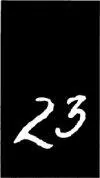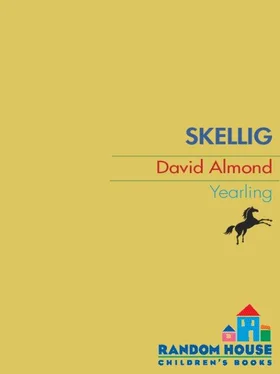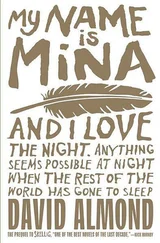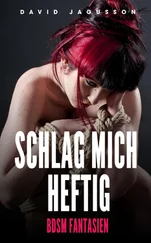David Almond - Skellig
Здесь есть возможность читать онлайн «David Almond - Skellig» — ознакомительный отрывок электронной книги совершенно бесплатно, а после прочтения отрывка купить полную версию. В некоторых случаях можно слушать аудио, скачать через торрент в формате fb2 и присутствует краткое содержание. Год выпуска: 2011, ISBN: 2011, Издательство: Random House Children's Books, Жанр: Фэнтези, Детская проза, на английском языке. Описание произведения, (предисловие) а так же отзывы посетителей доступны на портале библиотеки ЛибКат.
- Название:Skellig
- Автор:
- Издательство:Random House Children's Books
- Жанр:
- Год:2011
- ISBN:9780385729888
- Рейтинг книги:5 / 5. Голосов: 1
-
Избранное:Добавить в избранное
- Отзывы:
-
Ваша оценка:
- 100
- 1
- 2
- 3
- 4
- 5
Skellig: краткое содержание, описание и аннотация
Предлагаем к чтению аннотацию, описание, краткое содержание или предисловие (зависит от того, что написал сам автор книги «Skellig»). Если вы не нашли необходимую информацию о книге — напишите в комментариях, мы постараемся отыскать её.
Skellig — читать онлайн ознакомительный отрывок
Ниже представлен текст книги, разбитый по страницам. Система сохранения места последней прочитанной страницы, позволяет с удобством читать онлайн бесплатно книгу «Skellig», без необходимости каждый раз заново искать на чём Вы остановились. Поставьте закладку, и сможете в любой момент перейти на страницу, на которой закончили чтение.
Интервал:
Закладка:
“Yes.”
“We’re not dreaming this?”
“We’re not dreaming it.”
“We’re not dreaming it together?”
“Even if we were we wouldn’t know.”
The blackbird flew to the garage roof, began its morning song.
“No time to waste,” I said.
We went to the door, stepped inside. We moved swiftly through the furniture. I shined the flashlight on his face.
“You have to come with us,” said Mina.
He sighed, groaned.
“I’m ill,” he said.
He didn’t look at us.
“I’m sick to death,” he said.
We squeezed through the gap between the tea chests and crouched before him.
“You have to come,” she said again.
“I’m weak as a baby,” he said.
“Babies aren’t weak,” she whispered. “Have you seen a baby screaming for its food or struggling to crawl? Have you seen a blackbird chick daring its first flight?”
She put her hand beneath his armpit. She tugged at him.
“Please,” she whispered.
I held him too. I tugged. We felt him beginning to relax, to give himself up to us.
“I’m frightened,” he squeaked.
Mina bent close to him. She kissed his pale cheek.
“Don’t be frightened. We’re taking you to safety.”
His joints creaked as he struggled to rise from the floor. He whimpered in pain. He leaned against us. He tottered and wobbled as he rose. He was taller than us, tall as Dad. We felt how thin he was, how extraordinarily light he was. We had our arms around him. Our fingers touched behind his back. We explored the growths on his shoulder blades. We felt them folded up like arms. We felt their soft coverings. We stared into each other’s eyes and didn’t dare to tell each other what we thought we felt.
“Extraordinary, extraordinary being,” whispered Mina.
“Can you walk?” I said.
He whimpered, squeaked.
“Move slowly,” I said. “Hold on to us.”
I moved backward, between the tea chests. Mina supported him from behind. His feet dragged across the ruined floor. Things scuttled across us. The garage creaked. Dust fell. His breathing was hoarse, uneven. His body shuddered. He whimpered with pain. At the door he closed his eyes, turned his head away from the intensifying light. Then he turned again and faced the daylight. Through narrowed veiny eyes he looked out through the door. Mina and I gazed at his face, so pale and plaster dry. His skin was cracked and crazed. His black hair was a tangle of knots. Dust, cobwebs, bluebottles, spiders, beetles clung to him and fell from him. We saw for the first time that he wasn’t old. He seemed like a young man. Mina whispered it:
“You’re beautiful!”
I peeped out across the backyard toward the house, saw nobody at the window.
“Keep moving.”
I opened the gate, drew him by the hand. He leaned on Mina, shuffled out after me into the lane.
I closed the gate.
Already traffic could be heard in the city, on nearby Crimdon Road. The birds in the gardens and on the rooftops yelled their songs. Whisper appeared at our side.
“We’ll carry him,” I said.
“Yes,” said Mina.
I stood behind him and he leaned back into my arms. Mina took his feet.
We caught our breath at our ability to do this thing, at the extraordinary lightness of our load. I closed my eyes for a moment. I imagined that this was a dream. I told myself that anything was possible in a dream. I felt the great bulges at his back bundled up against my arms. We started to move.
We walked through the back lane, turned into another back lane, hurried to the green gate of the boarded house. Mina opened it with her key. We went through. We hurried to the door with the red sign: DANGER. Mina opened it with her key. We moved through into the darkness, then into the first room, and we laid him on the floor.
We trembled and gasped. He whimpered with pain. We touched him gently.
“You’re safe,” said Mina.
She took off her cardigan. She folded it and laid it beneath his head.
“We’ll bring you more things to make you comfortable,” she said.
“We’ll make you well. Is there anything you would like?”
I smiled.
“27 and 53,” I said.
“27 and 53,” he whimpered.
“I’ll have to go back,” I said. “My dad’ll wake up soon.”
“Me too,” said Mina.
We smiled at each other. We looked at him, lying beside us.
“We won’t be long,” I said.
Mina kissed his pale cracked cheek. She stretched her arms once more around his back. Her eyes burned with astonishment and joy.
“Who are you?” she whispered.
He winced with pain.
“My name is Skellig,” he said.
Chapter 23

MRS. DANDO CALLED THAT MORNING just after breakfast. She came on her bike on her way to school. She said my pals were looking forward to getting me back again.
“They say you’re the best tackler in the school,” she said.
Dad showed her all the work we’d done on the house. We showed her the backyard. She said everything would be bright and new for when the baby came home. She took her bag off her back. She took out a little cuddly black bear for Dad to give to the baby.
“And there’s this for you,” she laughed. “Sorry!”
It was a folder of homework from Rasputin and Monkey: worksheets with gaps to fill in and questions to answer. There was a note from Miss Clarts. (No real homework. Write a story. Get well soon!) There were sheets of math problems and a book called Julius and the Wilderness with a red sticker on the back.
Dad laughed as we watched her cycle away.
“No rest for the wicked, eh, son?” he said. “I’ll do the decorating. You get on with your work.”
I got a pen and took the work along the street to Mina’s front garden. She was sitting with her mum on the blanket underneath the tree. Her mum was reading, Mina was scribbling fast in a black book. She grinned and beckoned me over the wall when she saw me standing there.
Mina looked at the worksheets.
It is thought that Man is d_______from the apes .
This is the Theory of E_______ .
This theory was developed by Charles D_______ .
There was sentence after sentence like that.
Mina read the sentences out loud.
She said, “Blank blank blank,” in a singsong voice when she came to the dashes.
She stopped after the first three sentences and just looked at me.
“Is this really the kind of thing you do all day?” she said.
“Mina,” said her mum.
Mina giggled. She flicked through the book. It was about a boy who tells magical tales that turn out to be true.
“Yeah, looks good,” she said. “But what’s the red sticker for?”
“It’s for confident readers,” I said. “It’s to do with reading age.”
“And what if other readers want to read it?”
“Mina,” said her mum.
“And where would William Blake fit in?” said Mina. “ ‘Tyger! Tyger! burning bright/In the forests of the night.’ Is that for the best readers or the worst readers? Does that need a good reading age?”
I stared back at her. I didn’t know what to say. I wanted to get back over the wall and go home again.
“And if it was for the worst readers would the best readers not bother with it because it would be too stupid for them?” she said.
“Mina,” said her mum. She was smiling gently at me. “Take no notice,” she said. “She’s a bit uppity sometimes.”
“Well,” said Mina.
She went back to scribbling in the black book again.
She looked up at me.
Читать дальшеИнтервал:
Закладка:
Похожие книги на «Skellig»
Представляем Вашему вниманию похожие книги на «Skellig» списком для выбора. Мы отобрали схожую по названию и смыслу литературу в надежде предоставить читателям больше вариантов отыскать новые, интересные, ещё непрочитанные произведения.
Обсуждение, отзывы о книге «Skellig» и просто собственные мнения читателей. Оставьте ваши комментарии, напишите, что Вы думаете о произведении, его смысле или главных героях. Укажите что конкретно понравилось, а что нет, и почему Вы так считаете.







![David Jagusson - Fesselspiele mit Meister David [Hardcore BDSM]](/books/486693/david-jagusson-fesselspiele-mit-meister-david-har-thumb.webp)




